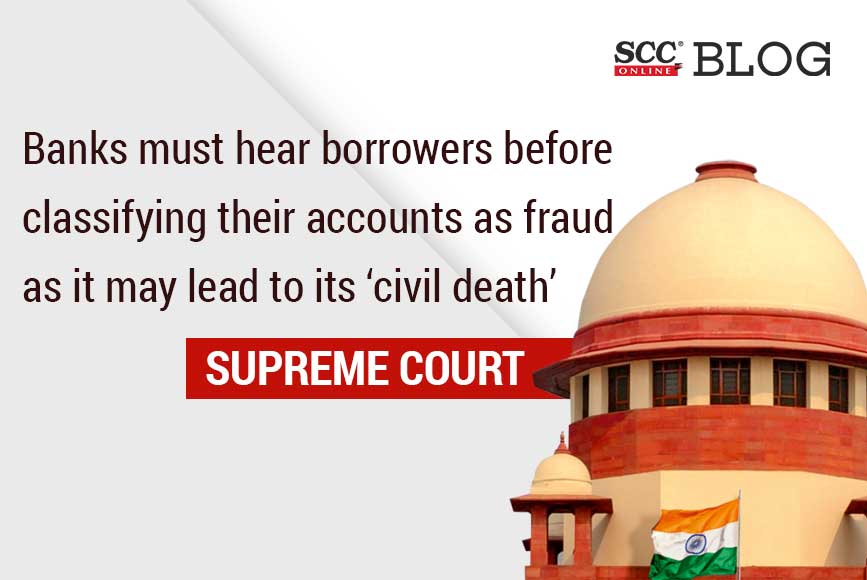Supreme Court: In a case where the Reserve Bank of India (Frauds Classification and Reporting by Commercial Banks and Select FIs) Directions 2016 was under challenge on the ground that no opportunity of being heard is envisaged to borrowers before classifying their accounts as fraudulent, the bench of Dr DY Chandrachud,* CJ and Hima Kohli, J, has held that while no opportunity of being heard is required before an FIR is lodged and registered, the principles of natural justice should be necessarily read into the provisions of the Master Directions on Frauds, to save it from the vice of arbitrariness.
Effect of classification of borrower’s account as fraud
Explaining that Classification of an account as fraud not only results in reporting the crime to investigating agencies, but also has other penal and civil consequences against the borrowers and may also be akin to blacklisting the borrowers for being untrustworthy and unworthy of credit by banks, the Court observed that,
“Classification of the borrower’s account as fraud under the Master Directions on Frauds virtually leads to a credit freeze for the borrower, who is debarred from raising finance from financial markets and capital markets. The bar from raising finances could be fatal for the borrower leading to its ‘civil death’ in addition to the infraction of their rights under Article 19(1)(g) of the Constitution. Since debarring disentitles a person or entity from exercising their rights and/or privileges, it is elementary that the principles of natural justice should be made applicable and the person against whom an action of debarment is sought should be given an opportunity of being heard.”
No implied exclusion of audi alteram partem
The Court held that the application of audi alteram partem cannot be impliedly excluded under the Master Directions on Frauds. In view of the time frame contemplated under the Master Directions on Frauds as well as the nature of the procedure adopted, it is reasonably practicable for the lender banks to provide an opportunity of a hearing to the borrowers before classifying their account as fraud.
“The principles of natural justice demand that the borrowers must be served a notice, given an opportunity to explain the conclusions of the forensic audit report, and be allowed to represent by the banks/ Joint Lenders Forum before their account is classified as fraud under the Master Directions on Frauds.”
Since the Master Directions on Frauds do not expressly provide an opportunity of hearing to the borrowers before classifying their account as fraud, audi alteram partem has to be read into the provisions of the directions to save them from the vice of arbitrariness.
Requirement of passing a reasoned order must be read into the Master Directions on Frauds
The Court directed that the decision classifying the borrower’s account as fraudulent must be made by a reasoned order as:
(i) a reasoned order allows an aggrieved party to demonstrate that the reasons which persuaded the authority to pass an adverse order against the interests of the aggrieved party are extraneous or perverse; and
(ii) the obligation to record reasons acts as a check on the arbitrary exercise of the powers.
The Court, however, made clear that the reasons to be recorded need not be placed on the same pedestal as a judgment of a court. The reasons may be brief but they must comport with fairness by indicating a due application of mind.
[State Bank of India v. Rajesh Agarwal, 2023 SCC OnLine SC 342, decided on 27.03.2023]
*Judgment authored by CJI Dr DY Chandrachud
Advocates who appeared in this case :
For Borrowers: Senior Advocates Dr Abhishek Manu Singhvi, Ranjit Kumar, Dhruv Mehta, Arunabh Chowdhury, Navin Pahwa, and Advocate Suraj Prakash;
For RBI and Lender Banks: Solicitor General of India Tushar Mehta, Senior Advocate Gopal Jain, and Advocates Ramesh Babu M R and G N Reddy.







